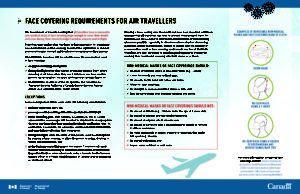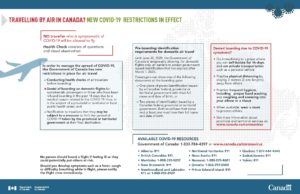Face covering requirements for air travellers – Since April 20th, 2020
Travellers must confirm that they have in their possession the mandatory non-medical mask or face covering as part of the registration or check-in process otherwise they will not be allowed to continue on their journey.
The Government of Canada is asking that all travellers have a removable non-medical mask or face covering large enough to cover their mouth and nose during their travel through Canadian airports and in-flight.

FOR MORE INFORMATION:
About non-medical masks and face coverings
FAQ – Face Coverings Requirements for Air Travellers
*****
Procedures to help minimize possible exposure to Coronavirus (Since March 28, 2020)
Following new regulations issued by Transport Canada regarding the Coronavirus, please find procedures to help minimize possible exposure to Coronavirus, which are in effect.
In order to manage the spread of COVID-19, the Government of Canada, along with the provinces and territories have put in place some new measures.
Prior to boarding a flight you will be required to undergo a health check and a verification that you have a face covering or mask to cover your mouth and nose This will involve answering a few simple questions to which you must answer truthfully. Providing a false or misleading answer could result in a maximum fine of $5,000.

We would ask for your immediate, truthful, response in answering questions from the agent as well as when an agent denies you boarding.
We are very thankful for everything you do to help all of us in overcoming this virus. We are confident you feel the same way!
In consideration for other passengers on board, we strongly recommend that you wash your hands with soap and water for at least 20 seconds before boarding as well!
Rest assured that we are cleaning and disinfecting the aircraft on a stepped schedule.
Thank you for your cooperation, we appreciate it greatly.
***
We understand our passengers may have questions about their travel plans and steps Air Creebec is taking to ensure their safety and that of our crew and other employees in response to Coronavirus (COVID-19).
As a result of the global pandemic facing us and after careful consideration of our passengers, our employees and the need to flatten the curve of infection for the population as a whole, Air Creebec has decided to further reduce our scheduled flights. This is a dynamic situation which we take very seriously and are making all efforts to be a good corporate citizen while maintaining a level of service to the remote and isolated communities we serve. We are actively changing our operations to adjust for the betterment and protection of all.
While the decision did not come without much discussion, we firmly believe it is in the best interest of all to do so. At this time, we do not intend to cease all service as we view the service we provide to our passengers and our clients as essential. We will do our utmost to continue providing an adequate level of service while acting with social responsibility to the population as a whole.
Please refer to our search flight block above for flight schedules as they may change depending on restrictions enforced, the need to protect all those we service and our employees and to encourage actions to be undertaken to assist in controlling the COVID-19 virus.
If you still have questions after reading below, please consider contacting us directly.
Is it safe to fly?
Safety is Air Creebec’s top priority and we are committed to providing our passengers and employees a safe travel and work environment.
Public health risk is continually reassessed as new information becomes available. Please consult the Coronavirus (COVID-19) page on travel.gc.ca for the latest information including travel advice.
We encourage our passengers and employees to travel with their own regulation-size hand sanitizers or disinfectant wipes (in containers 100 ml/100 g or less) and to engage in effective preventative measures.
The most recent travel advisories for Canada are available here.
How are aircraft cleaned?
Air Creebec aircraft are given a light groom after every connecting flight, a full groom every 24-hours, a complete interior detail monthly and an enhanced hyper-focused groom periodically as required, such as following the transport of a person who is known or suspected of having contracted COVID-19, other infectious illnesses, or has accidently expelled bodily fluids.
In response to the current Coronavirus (COVID-19) outbreak, Air Creebec has taken additional precautionary measures to disinfect aircraft daily at our main bases. Provisions to disinfect at connecting bases are also available as required.
We are continuing to clean with our approved products, including disinfectant wipes and sprays known to be effective against COVID-19.
These products are used on tray tables as well as general seating areas to ensure all guest contact surfaces are thoroughly disinfected. These products are used to accomplish the cleaning of our galleys, lavatories, tray tables, seat armrests, headrests, seatbelt buckles, the PSU panel, overhead bin door latches and lavatory door handles.
How clean is the air on the plane?
The idea that all aircraft air is recirculated is a common misconception. On our aircraft, fresh air is introduced into the cabin continuously in order to maintain pressurization. As such the air is constantly refreshed.
How can you protect yourself?
As indicated above, human Coronaviruses cause infections of the nose, throat and lungs. They are most spread from an infected person through:
- respiratory droplets generated when you cough or sneeze
- close, prolonged personal contact, such as touching or shaking hands
- touching something with the virus on it, then touching your mouth, nose or eyes before washing your hands
We encourage all passengers and employees to follow preventative measures in place.
More information is available here
How should masks be worn?
Masks are effective only when used in combination with frequent hand-cleaning with alcohol-based hand rub or soap and water. When you wear a mask, then you must know how to use it and dispose of it properly.
Hand washing is still the preferred method. Alcohol based hand rub is effective but too common a use could possibly lead to the development of microbes and viruses that develop an immunity to these products. That, apparently, does not happen with soap and water.
More information on masks is available here on WHO’s website.
What happens if someone is sick on my flight?
Should a passenger present ill or fall ill during travel, our agents and crews are capable of handling scenarios and situations that can arise on the ground or on board our aircraft. They have access to local health authorities as needed.
It is the agent’s and crew’s duty to assess, refuse or move anyone who is exhibiting signs of not being fit to fly due to illness.
To be noted that there has been no known transport of a passenger with COVID-19 to date. The only area in which we operate to have any persons infected with COVID-19 is Montreal and the airport there has a program in place to monitor for such passengers.
What do I do if I am not feeling well on a flight?
It’s important to self-identify so that our employees can ensure your safety along with the safety of other passengers and crew. Agents and crews are trained to handle multiple scenarios and situations that can arise on the ground or on board our aircraft. Local health authorities can be called in as needed.
Temporary conditions
For all Classes of tickets and for a trip planned before April 5, 2020, we accept to keep the ticket valid for a period of 12 months with the possibility of changing the date without any fees. Only one change of date will be authorized by this procedure. If the passenger prefers a refund, we will proceed with a 30% charge on all tickets. We will reassess the situation for the period after April 5, 2020.
Social (Physical) distancing
Given this exceptional situation, the first 2 rows on our commercial flights will be kept free, to promote social distancing. In agreement with most of our clients for chartered flights, we will avoid using the front row to limit the risk of virus spread and promote social distancing. We understand that this limits the number of seats available, however, these are exceptional measures for a situation that is just as unusual. This procedure allows us to maximize the chances of continuing our services without the risk of interruption due to a lack of air crew.
Please note, that our counter agents will ask you to hold your ID card rather than touch it. They will also ask you questions about your condition in order to allow you access to boarding. Thank you for your collaboration as our goal is to protect all passengers.
In-flight service
Meals are no longer served on our commercial flights. No snacks, no beverage, no coffee. Only water and juices are available in case of diabetic passenger need. Provision of this type of service is also under review for our charter customers.
All media material from the seat pockets (magazine, newspapers and others) have been removed. Only the security card is available in the seat pocket. This card is also on the list of items to be cleaned.
Boarding
Following recent new regulations issued by Transport Canada regarding the Coronavirus, you will see, at all our stations, posters of Covid-19 symptoms available in English, Cree and French.
Before all flights, in order to protect the spread of COVID-19, we ask all passengers for immediate, truthful, response in answering questions from the agent. A passenger can be denied boarding by our agent based on the answers.
Special schedule
Please refer to our bloc “SEARCH FLIGHT” above.
Cargo services
In Montreal, our Cargo service office located at 9475 Ryan, Dorval will be open Tuesdays and Fridays from 8 a.m. to 3 p.m. to receive packages for cargo services. For Quebec, please note that all packages can be shipped to the James Bay communities on charter flights when space permits.
For the recovery of packages arriving in Montreal, you will have to collect your packages within one hour of the arrival of the flight in Montreal, due to the reduced staff. Customers who pick up their package can call the Montreal office at 514-636-8501 to find out the arrival time. If the package is not picked up within one hour of arrival, your package will be available the following Tuesday between 8 a.m. and 3 p.m.
In Québec, for more information, please contact our Cargo services at 514 636-8501.
For more information on our services in Ontario, call 705 264-9521 at extension 3159.
Where should I go to find out more information?
Quebec/Coronavirus (French-Français)
Québec/Publications COVID-19 (French – Français)
Government Travel Advice and Advisories
Government of Canada Coronavirus (COVID-19) Updates
IATA – Air transport communicable diseases
Cree board of health and social services of James Bay
COVID-19 WEBSITE FOR EEYOU ISTCHEE
Guide autosoins (french only)
If you still have QUESTIONS, please consider contacting us and select the subject of you choice. For schedule, flight or tariff condition, please select “Customer Service”.
